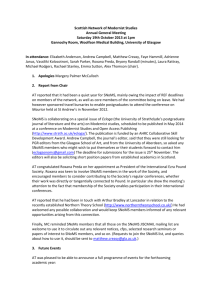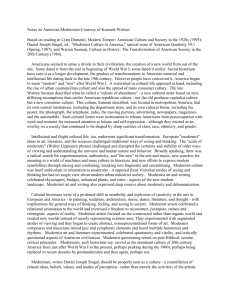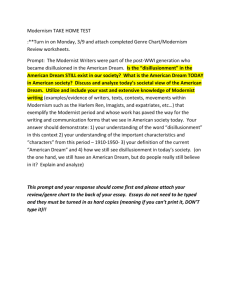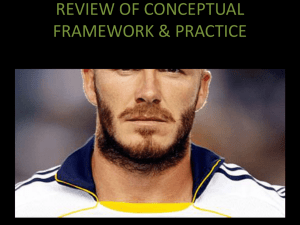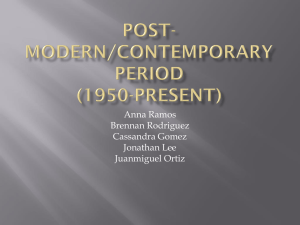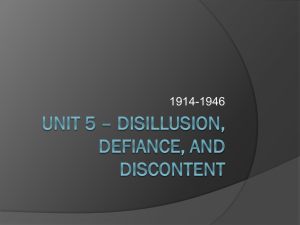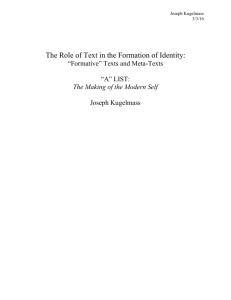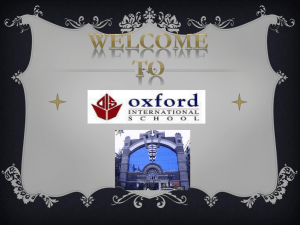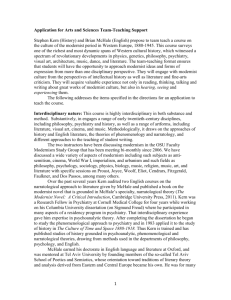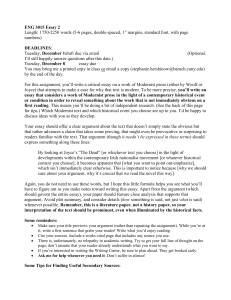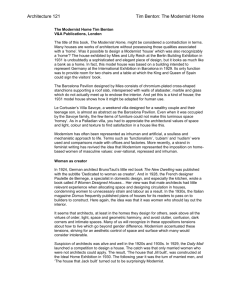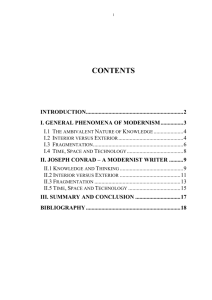Modernist Fiction - Hong Kong Shue Yan University
advertisement
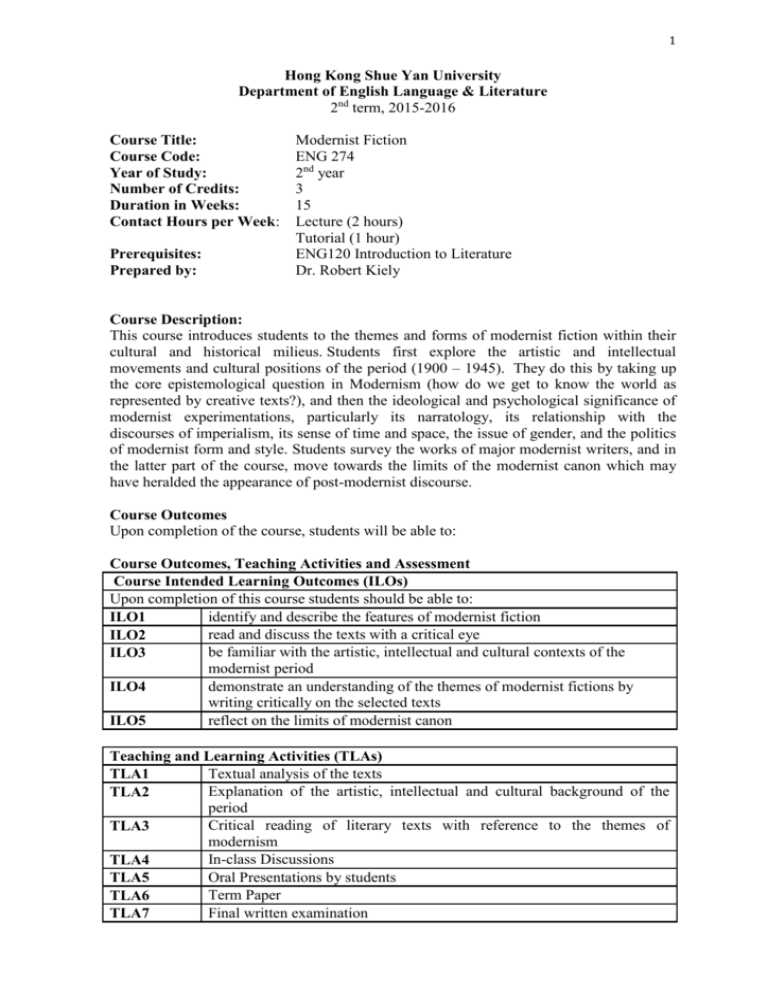
1 Hong Kong Shue Yan University Department of English Language & Literature 2nd term, 2015-2016 Course Title: Course Code: Year of Study: Number of Credits: Duration in Weeks: Contact Hours per Week: Prerequisites: Prepared by: Modernist Fiction ENG 274 2nd year 3 15 Lecture (2 hours) Tutorial (1 hour) ENG120 Introduction to Literature Dr. Robert Kiely Course Description: This course introduces students to the themes and forms of modernist fiction within their cultural and historical milieus. Students first explore the artistic and intellectual movements and cultural positions of the period (1900 – 1945). They do this by taking up the core epistemological question in Modernism (how do we get to know the world as represented by creative texts?), and then the ideological and psychological significance of modernist experimentations, particularly its narratology, its relationship with the discourses of imperialism, its sense of time and space, the issue of gender, and the politics of modernist form and style. Students survey the works of major modernist writers, and in the latter part of the course, move towards the limits of the modernist canon which may have heralded the appearance of post-modernist discourse. Course Outcomes Upon completion of the course, students will be able to: Course Outcomes, Teaching Activities and Assessment Course Intended Learning Outcomes (ILOs) Upon completion of this course students should be able to: identify and describe the features of modernist fiction ILO1 read and discuss the texts with a critical eye ILO2 be familiar with the artistic, intellectual and cultural contexts of the ILO3 modernist period demonstrate an understanding of the themes of modernist fictions by ILO4 writing critically on the selected texts reflect on the limits of modernist canon ILO5 Teaching and Learning Activities (TLAs) Textual analysis of the texts TLA1 Explanation of the artistic, intellectual and cultural background of the TLA2 period Critical reading of literary texts with reference to the themes of TLA3 modernism In-class Discussions TLA4 Oral Presentations by students TLA5 Term Paper TLA6 Final written examination TLA7 2 Assessment Tasks (ATs) Oral Presentation AT1 Students are required to deliver a group presentation on a selected topic Discussion and Participation AT2 Students are expected to participate in the discussion in class Term Paper AT3 Students are to submit a term paper of the length of 2500 – 3000 words on a selected topic at the end of the semester Final Examination AT4 Open-book format TOTAL 20% 10% 30% 40% 100% Alignment of Course Intended Learning Outcomes, Teaching and Learning Activities and Assessment Tasks Course Intended Learning Teaching and Learning Assessment Tasks Outcomes Activities TLA1,2,4,5,6 AT1,2,3,4 ILO1 TLA1,3,4,5 AT1,2 ILO2 TLA2,3,4 AT1,2 ILO3 TLA2,3,6,7 AT3,4 ILO4 TLA2,3 AT3,4 ILO5 Course Outline: Week 1 Modernism and Modernity Randall Stevenson. (1992) Modernist Fiction: An Introduction. pp. 1-15. Week 2 Modernism and Art Franz Kafka, “The Metamorphosis” (1915) Henry James, “The Real Thing” (1909) Virginia Woolf, “Modern Fiction” (1921) Weeks 3 & 4 Life, Death and Sexuality Thomas Mann, Death in Venice (1912) Week 5 Consciousness and Narratology D.H. Lawrence, “The Horse-Dealer’s Daughter” (1922) James Thurber, “The Secret Life of Walter Mitty” (1938) Weeks 6 & 7 Consciousness and Narratology William Faulkner, The Sound and the Fury (1929) Week 8 Modernist Bildungsroman Ernest Hemingway, “The Killers” (1928) Ruth Suckow, “A Start in Life” (1924) Week 9 Modernist Bildungsroman James Joyce, “An Encounter” from The Dubliners (1914) Katherine Anne Porter, “Flowering Judas” (1930) 3 Week 10 Reading Week Week 11 Modernism and Gender Dorothy Parker, “The Sexes” (1942) Virginia Woolf, “Mark on the Wall” (1927) Eudora Welty, “A Memory” (1930) Weeks 12 & 13 Modernism and Gender Virginia Woolf, To the Lighthouse (1929) Week 14 Modernism and Postmodernism Randall Stevenson. (1992) Modernist Fiction: An Introduction. pp. 195-199. Week 15 Reading Week Academic Honesty You are expected to do your own work. Dishonesty in fulfilling any assignment undermines the learning process and the integrity of your college degree. Engaging in dishonest or unethical behavior is forbidden and will result in disciplinary action, specifically a failing grade on the assignment with no opportunity for resubmission. A second infraction will result in an F for the course and a report to College officials. Examples of prohibited behavior are: Cheating – an act of deception by which a student misleadingly demonstrates that s/he has mastered information on an academic exercise. Examples include: Copying or allowing another to copy a test, quiz, paper, or project Submitting a paper or major portions of a paper that has been previously submitted for another class without permission of the current instructor Turning in written assignments that are not your own work (including homework) Plagiarism – the act of representing the work of another as one’s own without giving credit. Failing to give credit for ideas and material taken from others Representing another’s artistic or scholarly work as one’s own Fabrication – the intentional use of invented information or the falsification of research or other findings with the intent to deceive To comply with the University’s policy, the term paper has to be submitted to VeriGuide. Principal Texts William Faulkner, The Sound and the Fury Virginia Woolf, To the Lighthouse Supplementary Texts Armstrong, Tim. (2005) Modernism: A Cultural History. Cambridge: Polity. Booth, J. Howard and Rigby, Nigel, eds. (2000) Modernism and Empire. Manchester: Manchester University Press. Bradshaw, David. (2003) A Concise Companion to Modernism. Blackwell (eBook) Levitt, Morton P. (2006) The Rhetoric of Modernist Fiction. Hanover & London: University Press of New England. Linett, Maren Tova, ed. (2010) The Cambridge Companion to Modernist Women Writers. Cambridge University Press. Rabaté, Jean-Michel. (2007) 1913: The Cradle of Modernism. Oxford: Blackwell. Roe, Sue and Sellers, Susan. (2000) The Cambridge Companion to Virginia Woolf. Cambridge: Cambridge University Press. Stevenson, Randall. (1992) Modernist Fiction: An Introduction. Lexington, Kentucky: The University Press of Kentucky.
